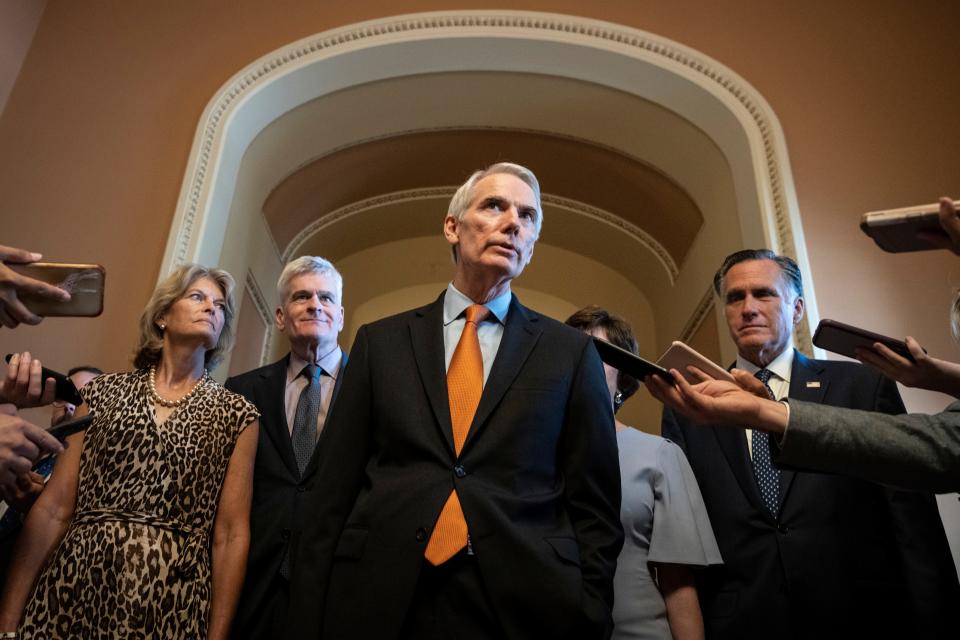Infrastructure bill advances to Senate debate, clearing major hurdle after weeks of negotiations
WASHINGTON – The Senate could pass a sweeping infrastructure bill by this weekend now that it cleared an important procedural hurdle Wednesday.
By a vote of 67-32, senators voted to advance the bipartisan bill – the largest transportation bill in U.S. history – clearing the way for one of President Joe Biden's key priorities.
The vote to move the bill to formal debate came only hours after the White House announced it reached a deal with the Senate on a mammoth bipartisan infrastructure package that has been in the works for weeks.
"This deal signals to the world that our democracy can function, deliver, and do big things. As we did with the transcontinental railroad and the interstate highway, we will once again transform America and propel us into the future," President Joe Biden said Wednesday in a statement released by the White House before the vote.
Roads, broadband and bridges: Here's what's in the infrastructure agreement

Twenty-one centrist senators – 11 Republicans and 10 Democrats – have been trying to reach a compromise since Biden first unveiled his American Jobs Plan in April.
But their scope has been around traditional transportation infrastructure, not Biden's more ambitious proposals to address poverty, climate and economic injustice that progressives are demanding be part of a larger compromise.
More: Joe Biden wants to provide millions of Americans with high-speed internet. It won’t be easy.
Senate Republicans last week blocked the start of formal debate on bipartisan infrastructure legislation because the bill text and cost weren’t available at he time. This time, GOP senators said enough details about the deal had been agreed to get the ball rolling.
"Reaching this agreement was no easy task – but our constituents expect us to put in the hard work and show that two parties can still work together to address the needs of the American people," a bipartisan coalition of senators said in a statement.
What's in the infrastructure bill agreement?
The deal includes about $550 billion in new funding above what the federal gas tax and other fees are expected to generate over the next eight years, according to the White House.
That money includes $40 billion in new funding for bridge repair and replacement, which the White House calls "the single largest dedicated bridge investment since the construction of the interstate highway system."
There's also $66 billion to modernize Amtrak and increase high-speed rail corridors across the nation, $55 billion to rehabilitate clean water systems, and $65 billion to expand broadband to the millions of Americans who found out how much a high-speed internet connection meant during the pandemic.
The package also would advance climate change priorities by spending $7.5 billion on electric charging stations and another $73 billion on clean energy transmission "by building thousands of miles of new, resilient transmission lines to facilitate the expansion of renewable energy," according to the White House.
Does the plan raise taxes?
The White House said the eight-year bill projected to cost more than $1 trillion does not include a raise in the 18.4-cent per gallon federal gas tax or a new fee on electric vehicles, proposals that had once been considered to pay for the package.
But the White House was otherwise vague on how to pay for the measure, saying it would be financed "through a combination of redirecting unspent emergency relief funds, targeted corporate user fees, strengthening tax enforcement when it comes to crypto currencies, and other bipartisan measures."
More: Senators celebrate bipartisan compromise on infrastructure. Now the hard part begins
It's not clear if taxes would be raised to pay for the bill, though Biden in his statement Wednesday said "we’re going to do it without raising taxes by one cent on people making less than $400,000 a year."
What happens next?
Even if it passes the Senate, the infrastructure bill still faces hurdles in the House.
More: Infrastructure bill blocked by Senate Republicans as lawmakers haggle over details
House Speaker Nancy Pelosi, D-Calif., said Wednesday she needs to see the text before it will get her endorsement, and she reiterated she won't bring it to a vote unless the Senate also passes a resolution paving the way for a much broader, $3.5 trillion package of infrastructure spending that would include housing, health care and climate change improvements.
That larger bill, unlikely to get a single GOP vote, would have to pass through a budget process known as "reconciliation" which would allow Democrats to approve it without having to overcome a filibuster in the Senate.
This article originally appeared on USA TODAY: Infrastructure bill advances by bipartisan vote in Senate

 Yahoo Movies
Yahoo Movies 
